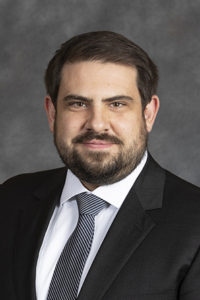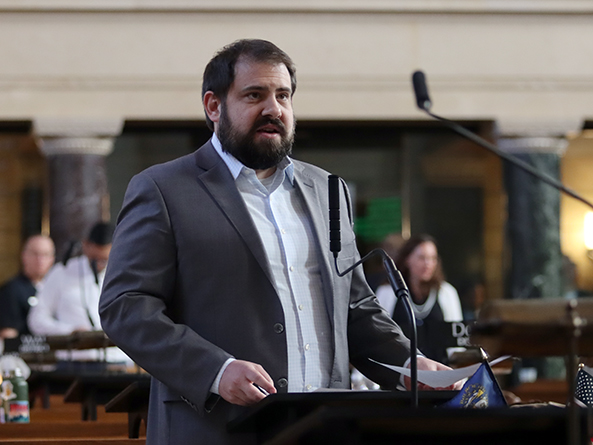Family caregiver credit, other revenue measures advanced
A proposal intended to help Nebraskans who incur expenses when caring for a family member cleared the first round of debate March 28 after lawmakers amended it to include nearly a dozen other tax measures.

Under LB937, introduced by Lincoln Sen. Eliot Bostar, a family caregiver would be eligible for a nonrefundable income tax credit equal to 50% of expenses incurred that are directly related to the care for and support of an eligible family member. The credit would be available beginning with tax year 2025.
“LB937 recognizes the hard work and sacrifices made by family caregivers and helps lessen the financially challenging impacts of family caregivers’ responsibilities,” Bostar said.
The maximum credit for a single tax year would be $2,000 or $3,000 if the family member is a veteran or has dementia.
Certain improvements to the family member’s primary residence, the purchase of durable medical equipment or the hiring of a home care aide would be among the expenditures eligible for the credit.
To qualify as an eligible family member, an individual would require assistance with at least two activities of daily living, live in a private residence and qualify as the caregiver’s dependent, spouse, parent or other relation by blood or marriage.
Only individuals with a federal adjusted gross income of less than $50,000, or $100,000 if married filing jointly, could claim the credit.
A Revenue Committee amendment would limit total credits to $2.5 million per year.
The amendment also contains provisions of 10 other bills heard by the committee this session.
Under the provisions of LB901, introduced by Linehan, purchases made by a nonprofit organization would be exempt from state sales and use tax if the nonprofit acquires property or contracts to build, improve or repair property that will be transferred to a nonprofit whose purchases already are exempt.
The amended provisions of LB1002, sponsored by Plymouth Sen. Tom Brandt, would set the maximum amount of tax credits available under the Nebraska Biodiesel Tax Credit Act at $1.5 million in calendar year 2025 and $2 million in the following years.
Under the amended provisions of LB1022, sponsored by Sen. Rita Sanders of Bellevue, film and television production companies could apply for a refundable income tax credit equal to 20% of their qualifying expenditures attributable to the production of films, documentaries and other projects in Nebraska.
The state Department of Economic Development could approve up to $1.5 million in credits each year.
The amended provisions of LB1025, introduced by Bostar, would create the Individuals with Intellectual and Developmental Disabilities Support Act.
Under the amendment, qualifying direct support professionals who care for individuals with intellectual and developmental disabilities could claim a refundable state income tax credit. Employers of direct support professionals could claim a nonrefundable credit.
The state Department of Revenue could approve a total of $2.5 million in credits under the act annually.
Currently, grocery stores, restaurants and agricultural producers may apply for a nonrefundable state income tax credit equal to 50% of the value of food they donate to food banks, pantries or rescues.
Under the provisions of LB1040, introduced by Omaha Sen. John Fredrickson, the state Department of Revenue could approve up to $1 million in credits each year.
The amended provisions of LB1072, sponsored by Sen. George Dungan of Lincoln, would allow a producer or importer of sustainable aviation fuel to claim a nonrefundable income tax credit based on the number of gallons sold or used in qualified mixtures.
Under the amended provisions of LB1084, introduced by Sumner Sen. Teresa Ibach, a Class III shortline rail company located wholly or partly in Nebraska could apply to the state Department of Revenue for a nonrefundable tax credit equal to 50% of its qualified maintenance expenditures during the tax year.
The credit amount could not exceed $5,000 per mile of track. The department could approve no more than $2 million in credits annually.
Under the provisions of LB1158, sponsored by Bostar, the state treasurer would contract with a medical debt relief coordinator to purchase and discharge medical debt of eligible residents.
Nebraska residents with a household income at or below 400% of the federal poverty guidelines or with medical debt equal to at least 5% of the individual’s household income would qualify.
Contributions to the program’s fund would be deductible for state income tax purposes.
Under the amended provisions of LB1184, introduced by Bostar, Nebraska taxpayers could apply to the state Department of Revenue for a one-time, refundable state income tax credit of up to $1,000 to offset the cost of installing a reverse osmosis system at their primary residence if test results show high levels of nitrates, uranium or certain chemicals in the drinking water.
The department could approve a total of $1 million in credits each year.
The amended provisions of LB606, introduced last session by Sen. Joni Albrecht of Thurston, would allow individuals, passthrough entities, corporations, estates and trusts to claim a nonrefundable credit of up to 50% of their state income tax liability on contributions they make to qualifying pregnancy help organizations.
Albrecht said the organizations assist pregnant women and new mothers by connecting them with jobs, education, transportation and housing.
Total credits would be limited to $2 million per year beginning in calendar year 2025.
Eligible organizations would have to provide the state Department of Revenue a written certification that they meet certain criteria. Among other requirements, an organization would have to be a nonprofit located in Nebraska that does not provide, pay for, provide coverage of, refer for, recommend or promote abortions.
Several senators objected to the proposal’s inclusion in the committee amendment. Omaha Sen. John Cavanaugh made a motion to divide the question and consider the provisions of LB606 separately from the committee amendment’s other provisions. The motion was successful.
Dungan said LB937 and the committee amendment comprise a “fantastic package” that would benefit Nebraska by attracting new industries, recruiting and retaining talented workers and providing “limited but impactful” tax relief to caregivers.
However, Dungan said, he did not vote to advance the bill from committee because of the inclusion of Albrecht’s proposal in the amendment.
Sen. Megan Hunt of Omaha also opposed the amendment containing Albrecht’s proposal. She said pregnancy help organizations, also called crisis pregnancy centers, do not offer or refer for comprehensive reproductive health care services including prenatal care, contraception or abortion.
Many provide misinformation and use deceptive tactics to dissuade individuals from accessing abortion services, Hunt added.
“By providing tax incentives for donations to crisis pregnancy centers, LB606 indirectly endorses and funds entities that engage in practices contrary to evidence-based medical guidance,” she said.
Bostar introduced an amendment that he said would broaden the definition of pregnancy help organizations but still exclude those that provide, pay for or provide coverage of abortions.
Albrecht opposed the amendment, saying “there is no way” she would support providing tax credits for contributions to organizations that provide referrals for or recommend abortions.
Bostar’s amendment failed on a vote of 17-24.
Senators then voted 28-15 to adopt the amendment containing Albrecht’s proposal and 37-0 to adopt the amendment containing the remainder of the committee amendment.
Brandt offered an amendment, adopted 34-0, to include provisions of his LB1047. They would expand the list of denaturants subject to an excise tax paid by ethanol producers and impose the tax on 2% of certain agricultural ethyl alcohol sold that is unfit for beverage purposes.
Brandt said the changes are necessary to reflect current industry practices and would allow the Nebraska Ethanol Board to raise sufficient revenue to fund its operations.
Finally, Sen. John Cavanaugh introduced an amendment, adopted 31-4, to include the provisions of his LB58, which would exempt diapers from state sales and use tax.
Cavanaugh said diapers are essential for the health of infants and young children and that taxing them burdens Nebraska families.
Senators then voted 40-0 to advance LB937 to select file.


